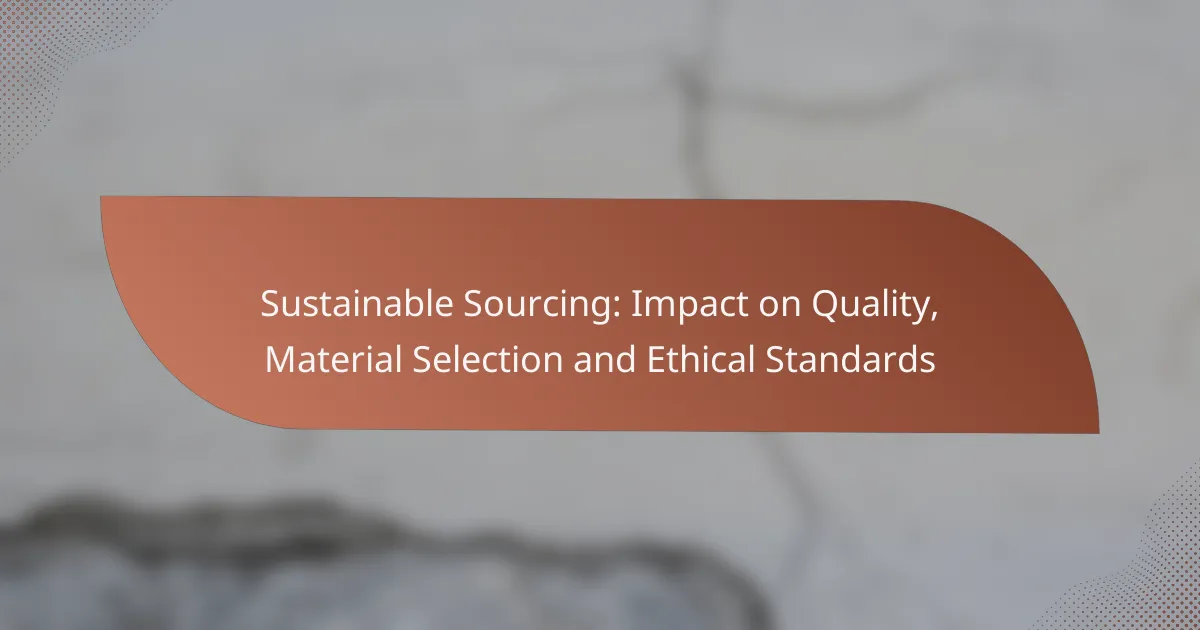Sustainable sourcing plays a crucial role in enhancing product quality by focusing on environmentally friendly and ethically produced materials. By prioritizing options like organic cotton and recycled plastics, companies not only improve durability and performance but also align with ethical standards that promote social equity and environmental responsibility. This holistic approach fosters consumer trust and encourages a more sustainable future.

How does sustainable sourcing impact product quality?
Sustainable sourcing significantly enhances product quality by prioritizing materials that are both environmentally friendly and ethically produced. This approach often leads to better durability, improved performance, and a positive consumer perception of quality.
Improved durability
Products sourced sustainably tend to have improved durability due to the selection of high-quality materials that are designed to last. For instance, using organic cotton instead of conventional cotton can result in textiles that withstand wear and tear better, reducing the need for frequent replacements.
Additionally, sustainable sourcing often involves rigorous testing and adherence to higher standards, which can lead to longer-lasting products. This not only benefits consumers but also reduces waste, aligning with eco-friendly practices.
Enhanced performance
When companies prioritize sustainable sourcing, they often discover materials that enhance product performance. For example, biodegradable plastics can offer similar or superior functionality compared to traditional plastics while being less harmful to the environment.
Moreover, sustainable materials can be engineered to meet specific performance criteria, such as moisture resistance or thermal insulation, which can improve the overall effectiveness of the product. This focus on performance can lead to innovations that set brands apart in competitive markets.
Consumer perception of quality
Consumers increasingly associate sustainable sourcing with higher quality, as they value products that are environmentally responsible. This perception can drive purchasing decisions, with many willing to pay a premium for items that reflect their values.
Brands that communicate their sustainable practices effectively can build trust and loyalty among consumers. Highlighting certifications, such as Fair Trade or organic labels, can further enhance the perception of quality and ethical standards in the eyes of the buyer.

What materials are prioritized in sustainable sourcing?
Sustainable sourcing emphasizes materials that are environmentally friendly, ethically produced, and of high quality. Key materials often prioritized include organic cotton, bamboo fibers, and recycled plastics, each offering unique benefits and considerations.
Organic cotton
Organic cotton is cultivated without synthetic pesticides or fertilizers, making it a healthier choice for both the environment and farmers. This method of production often results in lower water usage and improved soil health.
When selecting organic cotton products, look for certifications such as GOTS (Global Organic Textile Standard) to ensure compliance with organic farming practices. While organic cotton can be more expensive than conventional cotton, its benefits often justify the cost.
Bamboo fibers
Bamboo fibers are derived from the fast-growing bamboo plant, known for its sustainability due to minimal water and pesticide requirements. The fibers are biodegradable and can be processed into soft, durable textiles.
However, it’s essential to verify the processing methods, as some bamboo textiles undergo chemical treatments that may negate their eco-friendly benefits. Opt for brands that use closed-loop processes to minimize environmental impact.
Recycled plastics
Recycled plastics, often sourced from post-consumer waste, are increasingly used in textiles and packaging. This material helps reduce landfill waste and the demand for new plastic production, contributing to a circular economy.
When considering products made from recycled plastics, check for certifications like the Global Recycled Standard (GRS) to ensure the material’s authenticity and sustainability. While recycled plastics can vary in quality, they often provide a durable alternative to virgin materials.

What ethical standards are associated with sustainable sourcing?
Ethical standards in sustainable sourcing focus on ensuring that products are obtained in a responsible manner, considering environmental impact, social equity, and economic viability. These standards guide businesses in making decisions that promote fairness, transparency, and respect for human rights throughout the supply chain.
Fair Trade certification
Fair Trade certification ensures that producers receive fair compensation for their goods, promoting equitable trade practices. This certification often requires adherence to specific social, economic, and environmental standards, which can include minimum price guarantees and community development funds.
For consumers, purchasing Fair Trade products can mean supporting farmers and workers in developing countries, often leading to improved livelihoods and sustainable practices. Look for Fair Trade labels on products like coffee, chocolate, and handicrafts to make informed choices.
Transparency in supply chains
Transparency in supply chains involves openly sharing information about sourcing practices, including the origins of materials and the conditions under which they are produced. This standard helps consumers make informed decisions and encourages companies to maintain ethical practices.
To enhance transparency, businesses can implement traceability systems that track products from source to shelf. This can involve using technology like blockchain or regular audits to verify compliance with ethical standards.
Labor rights compliance
Labor rights compliance ensures that workers are treated fairly and work under safe conditions, free from exploitation. This includes adherence to regulations regarding wages, working hours, and the right to organize.
Companies should conduct regular assessments of their labor practices and engage with third-party organizations to ensure compliance with international labor standards. By prioritizing labor rights, businesses can foster a more ethical and sustainable sourcing environment.

How to select sustainable suppliers?
Selecting sustainable suppliers involves evaluating their environmental practices, ethical standards, and certifications. This process ensures that the materials sourced are not only of high quality but also produced responsibly and ethically.
Evaluate certifications
Certifications are crucial indicators of a supplier’s commitment to sustainability. Look for recognized certifications such as ISO 14001 for environmental management, Fair Trade for ethical practices, and FSC for responsible forestry. These certifications demonstrate adherence to specific standards that promote sustainability.
When assessing certifications, verify their validity and relevance to your industry. Some certifications may be more stringent than others, so understanding the differences can help you choose suppliers who align with your sustainability goals.
Assess environmental impact
Evaluating a supplier’s environmental impact involves examining their resource usage, waste management, and carbon footprint. Consider suppliers who utilize renewable energy sources, minimize waste, and implement efficient production processes. Tools like life cycle assessments can help quantify these impacts.
Request data on their environmental practices, such as energy consumption or waste reduction initiatives. This information can provide insights into how their operations affect the environment and help you make informed decisions.
Review supplier ethics
Supplier ethics encompass labor practices, community engagement, and transparency in operations. Investigate whether suppliers adhere to fair labor practices, provide safe working conditions, and engage positively with local communities. Ethical sourcing not only supports social responsibility but also enhances brand reputation.
Ask for information on their labor policies and community involvement. Engaging with suppliers who prioritize ethical standards can lead to long-term partnerships and contribute to a more sustainable supply chain.

What are the benefits of sustainable sourcing for e-commerce?
Sustainable sourcing offers e-commerce businesses numerous benefits, including improved product quality, enhanced material selection, and adherence to ethical standards. By prioritizing sustainability, companies can attract conscientious consumers and differentiate themselves in a competitive market.
Increased customer loyalty
Customers are increasingly drawn to brands that demonstrate a commitment to sustainability. When e-commerce businesses source materials responsibly and ethically, they foster trust and loyalty among consumers who value these principles.
To cultivate this loyalty, companies should communicate their sustainable practices clearly through marketing and product descriptions. Engaging customers with stories about sourcing and production can further strengthen their emotional connection to the brand.
Competitive advantage
Implementing sustainable sourcing can provide a significant competitive edge in the e-commerce landscape. As consumers become more environmentally conscious, businesses that prioritize sustainability can attract a growing demographic of eco-aware shoppers.
Companies should analyze their supply chains for opportunities to adopt sustainable practices, such as using renewable materials or reducing waste. This proactive approach not only enhances market positioning but can also lead to cost savings over time.
Positive brand image
A strong commitment to sustainable sourcing contributes to a positive brand image, which can enhance overall reputation and visibility. E-commerce businesses that prioritize ethical practices are often perceived as more trustworthy and responsible.
To build a positive image, brands should actively promote their sustainability efforts through social media, partnerships with environmental organizations, and transparent reporting on sourcing practices. This visibility can attract new customers and encourage repeat business.

How does sustainable sourcing affect pricing strategies?
Sustainable sourcing can lead to higher pricing strategies due to the increased costs associated with ethical materials and practices. However, businesses often find that these strategies can enhance brand loyalty and customer satisfaction, ultimately impacting long-term profitability.
Higher initial costs
One of the most significant impacts of sustainable sourcing is the higher initial costs incurred when selecting eco-friendly materials and suppliers. For instance, organic cotton or recycled materials can be more expensive than conventional options. Companies may need to invest in certifications or audits to ensure compliance with ethical standards, further increasing upfront expenses.
These higher costs can be a barrier for some businesses, particularly small enterprises. However, it’s crucial to weigh these costs against potential benefits, such as improved brand reputation and customer loyalty, which can justify the investment.
Long-term savings
While sustainable sourcing may require higher initial expenditures, it can lead to long-term savings through reduced waste and increased efficiency. For example, companies that adopt sustainable practices often find that they can lower operational costs by minimizing resource consumption and waste disposal fees.
Additionally, sustainable sourcing can mitigate risks related to supply chain disruptions and regulatory changes. By building relationships with ethical suppliers, businesses can ensure more stable pricing and availability of materials over time, leading to better financial predictability.
